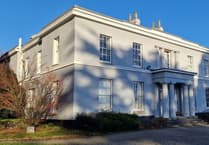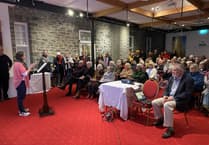AS WEST DEVON marks Quaker Week, reflecting the strength of the community here, the Times looks back at its origins in Tavistock and relevance today.
The Quakers are especially active and prominent in Tavistock due their community involvement at most levels, participating in local democracy, supporting Ukrainian guest refugees and enriching people’s lives in other ways. The Quakers call themselves spiritual, rather than religious, and encourage others to make sense of life through a strong sense of community.
Quaker Week, which runs all this week until Sunday (October 1) is being marked by open events to welcome newcomers to the Quaker Meeting House in Tavistock.
Tavistock Quaker Ken Orchard, who is also involved in Tavistock Football Club, describes the Quakers as “people who have become disillusioned with conventional Christian churches but who nevertheless are seeking a spirituality which will help them make sense of life”.
He went on to explain: “Quakerism supports such people in their search by encouraging them to work out their own spiritual belief system. What Quakers believe is not what the Quaker community is based on as much as how we practise our spirituality in our daily lives.
“Developing and staying true to our own spiritual paths can be a lonely and isolating life. It is so important to be part of a community of fellow seekers who, even though what they believe may vary in detail from what I believe, will all support each other in our journeys in seeking truth.”
Quaker Pete Squire, who is involved in the community as a Tavistock town councillor, said: “The core of the Quaker tradition is a way of inward seeking which leads to outward acts of integrity and service.
“Friends are most in the Spirit when they stand at the crossing point of the inward and outward life. And that is the intersection at which we find community. Community is a place where the connections felt in the heart make themselves known in bonds between people, and where the tuggings and pullings of those bonds keep opening up our hearts.”
He explained that Quakers see themselves as remaining relevant because they still exist as a faith community. There is no expectation that members need hold only certain beliefs. Important to the faith is not what members believe but how they behave in relation to others. While there are no set beliefs in Quakerism, there are a common group of goals, called Testimonies — simplicity, peace, integrity, community, equality, and stewawrdship.
Originating in England in the 1600s Quakerism evolved acknowledging and accepting the tenants of others faiths.
The Tavistock Quaker Meeting is part of the Devon Area Meeting of 12 other local meetings and acts as the executive body holding the membership and appointing roles. Anyone can attend a Quaker Meeting and are called attenders until and if they apply and are accepted into membership.
A Local Quaker Meeting is a public meeting for worship and usually lasts an hour, with people sitting largely in silence, but with people free to speak briefly. This is called ‘Ministering’. The Local Meeting offers a base for members to be supported in their contributions to their wider community.Historically, a number of Quaker beliefs were considered radical, such as the idea that women and men were spiritual equals and women could speak out during worship. Quakers don’t have official ministers or religious rituals. Neither do they use honorific titles such as our lordship and my lady, or even Mr, Mrs or Miss.
One of the earliest Quaker Meeting Houses was on Dolvin Road, and was photographed during the 1860s by William Merrifeld, photographer of Tavistock and Tavistock Subscription Library librarian.
It was taken possibly across the River Tavy from Market Road behind the Butcher’s Hall across to Dolvin Road Cemetery where a Quaker meeting house stood alongside the cemetery before being demolished in the 1870s.
Simon Dell, Quaker and Tavistock historian. says that the Quakers, or Friends, who settled at Tavistock in the early days are rarely mentioned in the local records.
The earliest indication of any Meeting at Tavistock occurs in the minutes of October 1702, when a sum of £1 4s. 0d. was granted to rent a place to meet. The first record of an established meeting place was in November 1740, a direction was given that a licence should be obtained for the meeting house at Tavistock via a ‘Friend’ — Jarvis Knight, steward to the Duke of Bedford.
The number of Friends grew as the town’s population swelled with the mining industry. Early meetings were held in a slum Exeter Street house with 1834 seeing 36 members. Friends asked the Duke of Bedford for a meeting house and he agreed on the Dolvin Road site, The building was constructed and the first meeting was on August 1835 with about 60 people.
Meetings for were regularly held here for about 25 years until, in 1865 only two Friends, a brother and sister, remained.
In 1870 it was closed and the Duke of Bedford bought it for £50. He demolished it and the Friends’ graveyard, with graves from some of the worshippers, was incorporated into the adjacent cemetery. A few headstones still indicate graves of Friends alongside.
Quakerism returned to the town after the Second World War, when one Melville Bickford, a Tavistock Lloyds Bank manager, revived the meeting in the reading room of the former Tavistock Subscription Library at Abbey Gate. He was joined by Tavistock teacher and artist Vic Gregory, who recalls that kindred spirits in Tavistock were brought together to practise actively as Quakers by their opposition to the fighting of World War Two. Eventually, that small meeting was dissolved.
The meeting was revived again in 1971 by a group of Friends who met once a month in each other’s houses rather than go every week to meet at the Swarthmore in Plymouth. By 1975, the Friends had decided that for the society to make itself known in the town, it would have to meet weekly and in a public place.
So the Quakers took a lease on the council-owned cottage in Canal Road in January 1975. The cottage was one of a line of buildings that had originally been going to be demolished by Tavistock Rural District Council, but was granted a reprieve. Tavistock Friends have met in the cottage since then – for more than 50 years.
Tavistock Quakers meet for worship on Sundays at 10am. Meetings lasts for an hour and are followed by at least half an hour for tea, coffee and conversation. All are welcome, whether Quakers or not.
Mid-week meeting are held on the last Wednesday in the month with worship for 45 minutes, starting at 12.30pm. At 1.15pm everyone has sandwiches, tea and chat.
As part of Quaker Week, anyone curious to find out more about their community is invited to come along to the Quaker Meeting at their Canal Road meeting house at 10am this Sunday (October 1) to be followed by a shared lunch with soup, bread and cheese. Further information about Tavistock Quakers can be found from the Tavistock group’s Facebook page ‘Tavistock Quaker Meeting’ or from member Pete Squire on 01822 613168.




